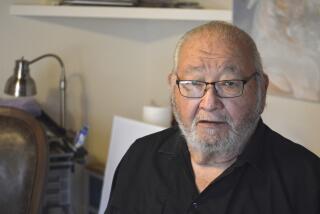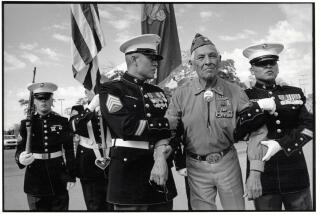At 98, No-Longer-Illiterate Man Turns the Page
- Share via
DALLAS — The old man grasped the pencil and drew a small X on the back of a sheet of notebook paper.
“All those years, that was all I had,” said George Dawson. “I been everywhere, but I could never write my name.”
Dawson got by for nearly a century with two crossed lines. But everything changed in 1996, when he turned 98.
A literacy volunteer arrived on his doorstep in a poor area in south Dallas. Adult education courses were being taught a few blocks away at the old high school.
Dawson didn’t hesitate. He became the Dallas school district’s oldest--and most celebrated--student.
“I never thought I was too old to learn,” said Dawson, who turned 102 in January. “That was the most important thing I did, to learn one letter from another.”
That was before he wrote a book about his life with the help of co-author Richard Glaubman, a teacher from the Seattle area. Published by Random House, “Life Is So Good” will be available in bookstores this month.
It’s only the latest chapter for the grandson of slaves, born on Jan. 18, 1898, in the east Texas town of Marshall. As the oldest of five children, he went to work instead of school. Life’s lessons were never easy.
One of Dawson’s earliest memories haunts him still. At 10, he recalled, he saw a black man lynched by a mob in downtown Marshall. Accused of impregnating a white girl, the 17-year-old was hanged from an old oak tree.
Witnessing the tragedy changed Dawson’s life. “There was lots of lynchings. Lots of things going on,” Dawson said, dabbing at tears. “I never did want to mix with people. I never said anything. I went on.”
Dawson never became bitter during those days when a Klan hood sparked terror, when he had to drink from separate water fountains and could not talk to a white man without bowing his head.
He learned from his parents to focus on the good in life, and wait. “The sun is hot, but after a while it cools off,” he said. “It’s got to change.”
And change even more.
“Some things has changed and some hasn’t,” Dawson said. “I don’t know whether it will ever get to where one man is the same” as another.
Dawson’s father hired him out, at 12, to a white family for $1.50 a month. The youngster lived on his employer’s farm so that his own family would have one mouth fewer to feed.
When he turned 21, Dawson worked his way across the country, traveling by steam train. His inability to read meant he often was at the mercy of others.
Dawson once paid for a railroad ticket from Marshall to Cleveland, then found out it would only take him as far as St. Louis. “They wouldn’t tell me the truth,” he said. “I had to take what they’d say.”
But still he traveled, sometimes buying tickets, sometimes riding with hobos. He went to Canada just to see snow. In Mexico, he ate for the first time in restaurants where men of all colors sat side by side.
Dawson built levees on the Mississippi, drove spikes for the railroads and worked in a sawmill. He met his first wife, Elzenia, while breaking horses in the Texas Panhandle.
They settled in Dallas, where Dawson worked two jobs. They had seven children, all of whom went to college.
“He’d always dwell on school and how to earn your own money,” said Dawson’s son George Jr. “He said that if you had your own, you don’t have to steal or worry. Without a job, you are dependent on others.”
Dawson hid his own dependency, his illiteracy, for much of his life. He said he didn’t really miss reading until 1947, when he couldn’t make out the box scores of baseball great Jackie Robinson.
“Jackie Robinson was the first colored man to break into baseball with the white folks. I was working at Oak Farms Dairy then,” Dawson recalled. “I remember saying, ‘Hit that ball, Jackie.’ He hit it.”
Dawson’s toughest loss to illiteracy was a big promotion at the Dallas dairy where he worked for 25 years. He turned down a job as engineer because he knew he couldn’t write the daily reports.
When he retired at 65, he signed his meager Social Security checks with an X. He learned the other letters in his first two days of school.
His teacher, Carl Henry, was nervous at first. “In my mind, I said, ‘Oh my goodness! How in the world do I start teaching a 98-year-old man?’ ”
But Dawson approached schooling like everything else, wholeheartedly.
He soon insisted on learning cursive writing. When Henry tried to teach him to print, the old man told his teacher, “No, son, I want to join them together.”
Dawson’s handwriting now is as good as Henry’s. He’s reading at a fifth-grade level and hopes to earn his general equivalency diploma.
And Henry’s class has doubled in enrollment since Dawson joined.
“Some really thought they couldn’t learn,” the teacher said. “But when they saw what he’s done, they changed their minds.”
Sometimes Dawson sings slave songs, learned from his grandmothers, to fellow students. And sometimes he gives inspirational talks to schoolchildren, telling them, “I’m trying to get what you all don’t want.”
Dawson goes to school five days a week. In his free time, he loves to fish and watch Texas Rangers baseball games on television.
He’s lived alone since his fourth wife died 12 years ago, but he is visited often by his children, 19 grandchildren and more great-grandchildren than he can count.
Family photos line the walls of his tiny living room, and a tattered Bible, a gift for his last wife, rests on a cloth-covered coffee table. Dawson bought the Bible from a traveling salesman. He said he sometimes thumbed through it, the letters and words holding no meaning.
Now he can read it aloud at the church he’s attended since 1928. His favorite passage comes from John 1:23: “I am the voice of one crying in the wilderness.”
Coauthor Glaubman, who first learned about Dawson from a 1998 newspaper article, calls the old man’s life a lesson for all.
Dawson doesn’t expect his life to change much with the publication of his story. If he makes some money from the book, he might fix up his house or at least patch the leaky roof.
He’s never been one to turn away from a challenge. “A man should think how far he can get in life,” he said. “Never think you can’t.”
More to Read
Sign up for Essential California
The most important California stories and recommendations in your inbox every morning.
You may occasionally receive promotional content from the Los Angeles Times.













